- Home
- Patrick Robinson
Intercept
Intercept Read online
Table of Contents
OTHER BOOKS BY PATRICK ROBINSON
Title Page
Prologue
Chapter 1 - FIVE YEARS LATER
Chapter 2
Chapter 3
Chapter 4
Chapter 5
Chapter 6
Chapter 7
Chapter 8
Chapter 9
Chapter 10
Chapter 11
Chapter 12
Chapter 13
Epilogue
Copyright Page
OTHER BOOKS BY PATRICK ROBINSON
Novels
Ghost Force
Hunter Killer
Scimitar SL2
Barracuda 945
Slider
The Shark Mutiny
U.S.S. Seawolf
H.M.S. Unseen
Kilo Class
Nimitz Class
Diamondhead
To the Death
Nonfiction
Lone Survivor (written with Marcus Luttrell)
Horsetrader: Robert Sangster and the
Rise and Fall of the Sport of Kings
One Hundred Days: The Memoirs of the
Falklands Battle Group Commander
(written with Admiral Sir John Woodward)
True Blue (written with Daniel Topolski)
Born to Win (written with John Bertrand)
The Golden Post
Decade of Champions: The Greatest Years in the
History of Thoroughbred Racing, 1970-1980
Classic Lines: A Gallery of the Great Thoroughbreds
Prologue
SUNRISE TAKES ITS sweet time up here among the high peaks. To the east stand the awesome ramparts of the Himalayas, 1,550 miles of towering summits that block out the early morning light from the western escarpments, all the way from southern China to Afghanistan.
There are tiny mountain villages clinging to the slopes of the Hindu Kush range where the sun does not peer over the pinnacles until long after the herdsmen have led the goats to the damp pastures above the mud-built dwellings.
The light is soft and suffused, the brightness in the sky being perhaps ten thousand feet higher, like God’s fluorescence, and the valleys seem gloomy, painted only with the colors of the earth.
It was into this half-lit melancholy that SEAL Team 10, representing an infuriated United States of America, came bursting through on a cool autumn morning in 2004. The time was 6:30 a.m., and there were twelve of them from Foxtrot Platoon, fanning out, pounding across the rough ground, taking this apparently peaceful and defenseless township by the throat, terrifying women and children.
The U.S. troops unleashed the occasional burst of machine-gun fire, in staccato volleys designed to intimidate, to display this frontline U.S. muscle, as if anyone could possibly have doubted the deadly nature of their purpose.
All twelve of them were heavily bearded. Ten of them stood more than six-foot-three in height. Any two of these giant warriors would have made a massive presence anywhere. The dozen, working as a trained fighting force, would have frightened the bejesus out of Genghis Khan.
Each man was dressed in combat “cammies,” and eight of them wore their “drive-on rags,” camouflaged bandanas. Eleven of them carried the SEAL’s preferred personal weapon, the M4 light machine gun. The group commander was armed with a Mark 12 .556-caliber rifle. In their wide leather belts they each carried a combat knife and a SIG-Sauer 9mm pistol. Four of them had a half-dozen grenades strapped into their battle-harnesses. The rest had a minimum of two grenades, instantly reachable.
The SEALs moved door to door in pairs, shouting harsh, controlled commands, ordering everyone out into the main open area between the two streets. It was like a cattle roundup, except the young bulls in this coral were all bearded, wearing turbans and light sandals. The women and children were herded into a separate area. From afar, oxen, tethered to homemade carts, stared balefully at the shattering interruption being conducted in a village devoid of upheaval for centuries.
The SEAL leader, a powerful-looking officer aged around twenty-eight, stood in the central area, barking short commands: “Door to door, guys. No houses unsearched. Keep it moving. Don’t turn your backs. Get against that wall. Hands high. Anyone breaks, shoot.”
From time to time, he murmured into his comms transmitter, “Moon men on station, sir. No casualties. Village under tight arrest. Roger that, sir. Over.”
Within ten minutes of this astonishing uproar among tribal lives unaltered since biblical times, the whole population had submitted to U.S. interrogation, except for two early herders up on the high pastures. And one by one the SEALs singled out men from the crowd, taking them aside, searching them for hidden weapons and cell phones, examining their beards, hair, fingernails, toes—always rough, always with methods designed to frighten.
These were the most dangerous lands in the world, the lawless high peaks of the Hindu Kush, home to the outlawed Taliban, to the regrouping tribal warriors of al-Qaeda, the men who hate the United States as no other nation has ever been hated, not since Nazi Germany crushed the European mainland sixty years previously.
The village men were generally of far smaller stature than the giant U.S. Navy SEALs. The Americans had little difficulty in manhandling them, slamming them against the wall, roughing them up, demanding answers from men who claimed to speak no English. The watchwords were truculence, sullen obdurate defiance, and, of course, the burning, seething hatred.
There was yelling, and the occasional scuffle. One youngish man spat in the face of a SEAL and received a thunderous right hook to the jaw, which snapped it clean in half and dumped him half-conscious on the rough, sandy gravel. A hundred yards away his mother wept uncontrollably, his father, had he carried his tribal dagger, would have gladly plunged it into the heart of the American. Generally speaking, the SEALs were carrying out their ruthless mission to the letter. There was, perhaps, some weakness in the hearts-and-minds department.
It was impossible to ignore the rough edges and dark anger of the U.S. Special Forces. Just as it was impossible to ignore the inner loathing the tribesmen and women displayed toward them. It was an emotional stand-off beyond redemption. The big men from the West had traveled far and suffered greatly to reach this wild and inaccessible place, where there were no roads, no electricity, no radios, no transportation. For their part the Afghanis knew only that these armed, bearded monsters were their most implacable enemy.
And what did the Americans want? They wanted two men, two highly qualified al-Qaeda field operatives (one of which had been educated at Harvard), who had created a bomb—a regular IED—that had blasted to pieces a truckload of marines in the outskirts of Kabul. The bomb killed everyone, fifteen United States marines and two SEAL Team 5 guys from San Diego. The highway had run red with their blood. Two of the SEALs rampaging in the village had helped clear the remains of their comrades from the scene.
U.S. military intelligence had moved into high gear. Every mole, spy, agent, and informant had been alerted, and, in the end, someone came through. The two men were holed up in the high peaks, some fifty miles northeast of the U.S. military base at Bagram. There was only one village inside the GPS numbers U.S. INTEL had issued. And it had taken three days trekking, in shocking weather, across the mountain, for the SEALs to get here.
They came in off a night insertion by helicopter. Twenty of them. The other eight were hunkered down on the face of the mountain high above, their powerful binoculars trained on the uproar their colleagues were causing in the village. Up here, ten thousand feet above sea-level, the treeline shuts down suddenly. The green does not taper off, it just ends.
This particular mountain, which was often lush from the rains and tumbling streams fed by m
elting snows, was a stark and overwhelming study in two parts: the green and verdant lower half, and the moonscape from the upper treeline to the snowcapped summit. There is no cover up there. It’s a near vertical landscape of dust, sand, rocks, and shale, inhabited by no one. Which was why the eight-man SEAL back-up team was camped in the highest vegetation, concealed, staring down, ready to move to the village at the first sign of Afghan resistance. So far there was none, at least nothing worse than a foolish act of messy bravado by the kid with the now-shattered jawbone.
Five times during the night, on the way into the ops area, they had checked the validity of the INTEL. And five times they had been told the two men were in there, tracked by the United States, all the way up through the passes, by careless use of their cell phones.
And now they were cornered, desperate to lie and cheat their way out of trouble, determined to pass themselves off as innocent goat-herders. Unhappily for them, SEAL Team 10 knew precisely what they were looking for.
Ibrahim Sharif and his childhood friend Yousaf Mohammed, both twenty-four, were the men who made the bomb that killed the Americans. Devoted followers of Osama bin Laden, each of them was being groomed for al-Qaeda’s highest command. They were mountain men by birth but had been selected in their early teens to be educated in the west, backed by family money from bin Laden, or, The Sheik, as his followers preferred.
Ibrahim had found his way into Harvard by way of the University of Cairo. Yousaf had taken a degree in chemical engineering at the Aga Khan University in Karachi, followed by a post-graduate course at the University of London. Both men had enjoyed the freedoms of the West, but at the conclusion of their studies were once again drawn back to the fanatics of al-Qaeda, the mountain warriors whose trade was murder and mayhem, and whose creed was to spill blood in the name of Allah. American blood.
And now they stood among the tribesmen, herded into a group, watching these massive U.S. troops haul out their countrymen from the pack, ram them back against the wall, searching and shouting. Four houses down the rough, unmade street was the house of Ibrahim’s father, the house in which they were staying, a crude place of standard Afghan construction (three rooms on three levels, with a cooking stove in the center, goats in the lower floor) built into the side of the mountain. And five tons of crated TNT hidden in a stone cave hollowed out of the mountain, right below the goat-hooves.
Two SEALs had been staring hard at the two men, and one of them was the platoon commander. And now he snapped out an order, instantly obeyed, “HIM! The guy with the red vest. Get him over here.”
Ibrahim swiveled half-left to see who had shouted the command, and in that moment, the SEAL commander knew the Afghani understood English. Two of his team moved forward and dragged Ibrahim out from the crowd. Futilely he resisted, pulling back, trying to escape. It was like trying to break out of a sealed bank vault.
The iron men from Coronado hauled him into the open and pinned him against the wall. The commander stepped forward and demanded, “What’s your name?”
Ibrahim, a red mist of anger, resentment, and flaming hatred for the infidel, this intruder, this disgusting American, kicked out at the SEAL leader, who, in one movement struck back. He grabbed Ibrahim’s ankle and pulled it three feet above the ground. Then he grabbed the man by the balls and tipped him backward to the ground.
The Afghan never uttered a sound, crashed back onto the mud-dried road, shaken and slightly unhinged. When he refocused he found the SEAL leader’s boot on his throat. And then he was dragged up, right next to an overflowing rain barrel, and asked his name yet again. He made no reply and then the big SEAL asked him where he kept the explosive. Again there was no response, just a hard-eyed stare of pure hatred.
Ibrahim, silently enraged, pulled up his head and spat at his captor. He missed and too late recognized his mistake. The SEAL grabbed him by the beard and plunged him facedown into the rain barrel.
Ibrahim kicked and struggled, and almost resigned himself to a one-way trip into the arms of Allah when the American pulled him out and demanded to know the whereabouts of the explosive.
The half-drowned Afghani said nothing, and by now every eye was turned onto this one-sided confrontation. Again the SEAL leader plunged Ibrahim’s head into the water, ramming his head back to the bottom of the barrel. This time he kept him there for twice as long, finally dragging him into the air when the desperate struggles had ceased.
For a split second, it seemed that Ibrahim was dead, but two SEALs grabbed his feet, turned him upside down, and pummeled his back. Water gushed from his mouth. And Ibrahim breathed again.
“Listen, pal,” said the SEAL commander. “Right now, I’m going to kill you, right there in that goddamned barrel. I know you understand me, and you got just one last chance to save your own life. Where is the explosive? You got exactly five seconds to live. . . . ”
Ibrahim was only mildly afraid of death. He had been brought up to understand the glory of the martyr in the eyes of the Prophet. He had no doubt whatsoever this brutal enemy would carry out his threat, and no doubt Allah would await him when he crossed the bridge. But there was terror in his heart at the thought of drowning in that deep rainwater. He could not tolerate that, and he trembled with fear, justifying his own cowardice by reasoning that these Americans were going to find the dynamite anyway.
He raised his right arm and said quietly, “Third house down there. Under the basement.”
The SEAL leader detailed four of his team to tie Ibrahim’s wrists and then march him to the house. Then he turned again to the crowd and shouted, “Guy in the orange vest. Over here, pal. And look real quick about it.”
And Yousaf Mohammed, the ex-London University chemical engineering student, the only other “tribesman” but Ibrahim, who had clean hair and fingernails, soft hands, and a groomed beard, stepped forward, betrayed by his personal hygiene, and, unknowingly, by his obvious comprehension of the English language. No goat-herder, this guy.
The four SEALs who had tied up Ibrahim now lashed the wrists of Yousaf together, and the six of them marched off down the street, directly to the third house, the one in which the half-drowned member of the village had been born. His cohort, the fanatical jihadist Yousaf, from across the border in Pakistan, was already wanted by the Americans for multiple acts of terrorism, including gunning down a U.S. diplomat and blowing up a hotel in central Baghdad.
The two men tethered together, walking in company with the warriors from SEAL Team 10, were among the most dangerous terrorists in the free world. But even if the explosive was discovered, there would be almost no evidence against them, no proof, no documents.
They were just a couple of unknown killers, without passports or identity, known perhaps only to Allah and their earthly families. The American military did not even know their true names, but they had tracked them for many months, and assessed that these were a couple of utterly ruthless characters from whom the public must surely be protected. The military had risked the lives of twenty SEALs and a gunship crew to make this insertion to either capture or kill the two men. And the U.S. military does not make such decisions without cast-iron reasons.
Now the six men reached the third house down the street, and the SEALs began the most dangerous part of their mission. For all they knew the place was booby-trapped. Somewhere inside there could be a concealed detonator. The touch of a button could blow them to pieces. Like the marines. Like the two SEALs in Kabul.
Both captives were now murmuring lines from the Koran, repeating constantly a mantra in Arabic that the SEAL 2I/C understood: Allah is great. There is no other God but Allah. Guide us on the straight path. Light upon light. Allah be praised, for you are great.
One of the SEALs told them both to zip it. Ibrahim shut up, but Yousaf kept right on murmuring in praise of Allah, and the SEAL commander kicked him straight in the ass, sent him sprawling into the doorway. He climbed to his feet and there was hatred in his dark eyes and murder in his heart. One day he’d get hi
s revenge. And silently he swore that to himself. Nonetheless, he held back on the prayers.
The stench in the house was overwhelming, which was not all that surprising since a half-dozen goats lived on the floor below. The pall of smoke hung in the air, for there was no chimney, and the stove in the middle of the room was alight and ready to bake the morning flatbread.
Ibrahim led the way through the suffocating air, down the steps, past the goats, and onto the mountainside. He moved carefully down a pathway to a rocky area and pointed at the boulder in the center.
Two of the SEALs grabbed it and heaved. It rolled forward revealing a stack of crates, low flat wooden boxes, more like gun cases than crates for high explosive. The hiding place was sensational. Anyone could have searched these mountains for a thousand years and never found them—unless they had the assistance of the still-waterlogged Ibrahim Sharif, bombmaker.
And so concluded the mission to capture the two terrorists and dispose of the explosive. The SEALs detonated it high on the mountain about a mile away. The Commander held the villagers under arrest, while he opened up the comms to Bagram and called in a big MH-47 army helicopter for the evacuation of his troops and their two prisoners.
The copter touched down on the edge of the village shortly before 0930. The SEALs’ commanding officer made the forty-five-minute ride up into the mountains to familiarize himself with this village, which was plainly so important to the remnants of bin Laden’s murderous secret army. He walked down the ramp to congratulate his mission commander. He shook his hand and said firmly, “Great job, Mack.”
1
FIVE YEARS LATER
FOR FIVE LONG YEARS, Ibrahim Sharif and Yousaf Mohammed had never stepped beyond the razor-wire of the Guantanamo Bay Prison. They were separated immediately upon arrival, and spent the remainder of their captivity meeting only in the exercise area.
Both men were subjected to rigorous interrogation, but neither of them ever cracked again—not since the SEAL commander had held Ibrahim’s head under the water in the rain barrel and forced him to reveal the whereabouts of the local dynamite supply.

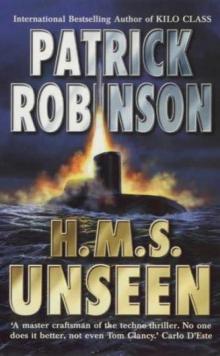 H.M.S. Unseen am-3
H.M.S. Unseen am-3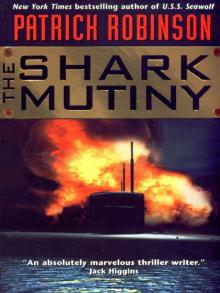 The Shark Mutiny (2001)
The Shark Mutiny (2001)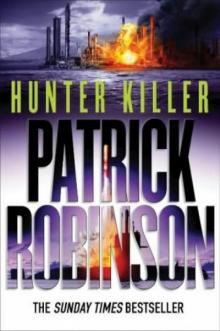 Hunter Killer am-8
Hunter Killer am-8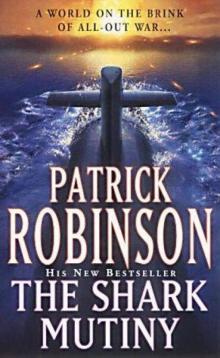 The Shark Mutiny am-5
The Shark Mutiny am-5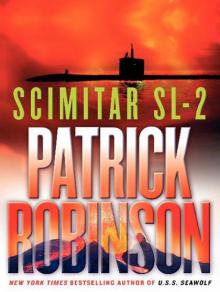 Scimitar SL-2
Scimitar SL-2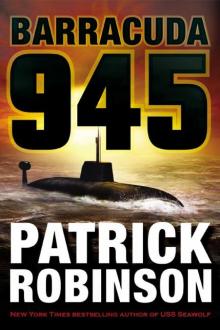 Barracuda 945 am-6
Barracuda 945 am-6 Hunter Killer
Hunter Killer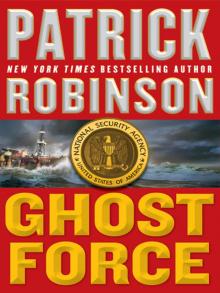 Ghost Force
Ghost Force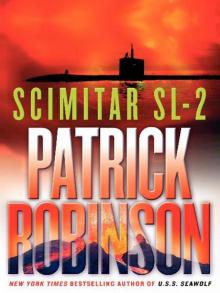 Scimitar SL-2 (2004)
Scimitar SL-2 (2004)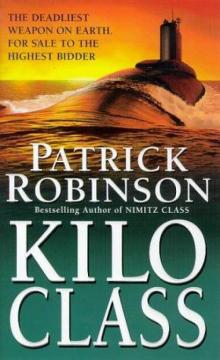 Kilo Class am-2
Kilo Class am-2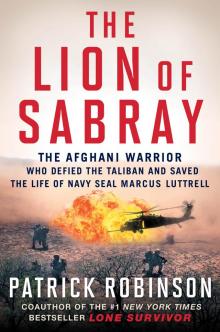 The Lion of Sabray
The Lion of Sabray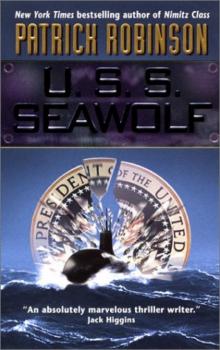 U.S.S. Seawolf am-4
U.S.S. Seawolf am-4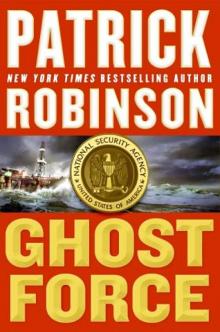 Ghost Force am-9
Ghost Force am-9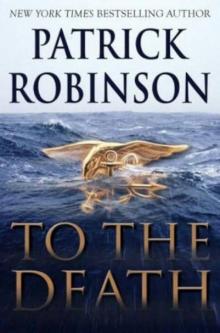 To the Death am-10
To the Death am-10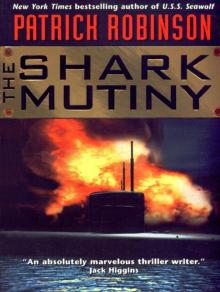 The Shark Mutiny
The Shark Mutiny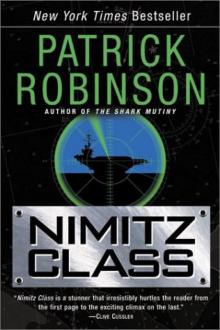 Nimitz Class am-1
Nimitz Class am-1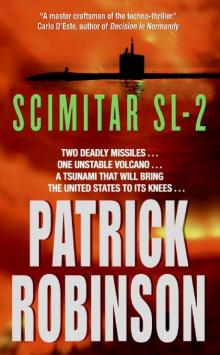 Scimitar SL-2 am-7
Scimitar SL-2 am-7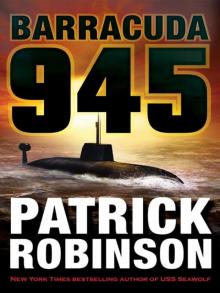 Barracuda 945
Barracuda 945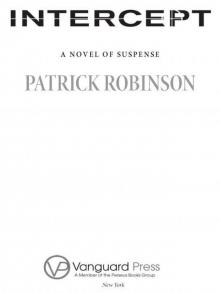 Intercept
Intercept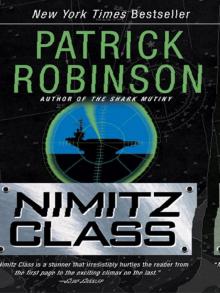 Nimitz Class (1997)
Nimitz Class (1997)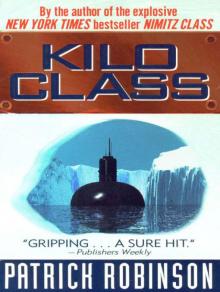 Kilo Class
Kilo Class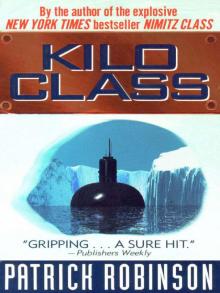 Kilo Class (1998)
Kilo Class (1998) Diamondhead
Diamondhead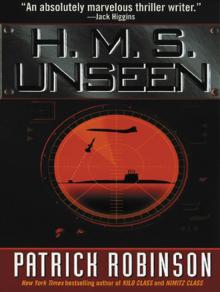 H.M.S. Unseen
H.M.S. Unseen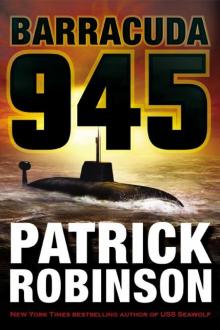 Barracuda 945 (2003)
Barracuda 945 (2003)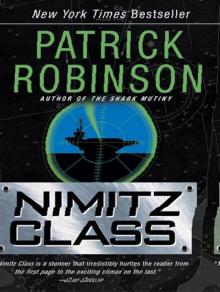 Nimitz Class
Nimitz Class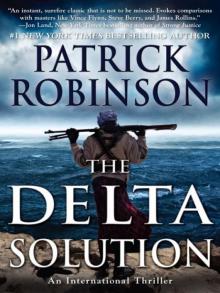 The Delta Solution
The Delta Solution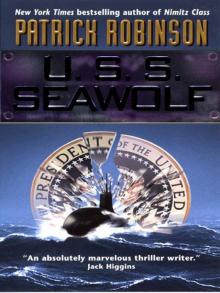 U.S.S. Seawolf
U.S.S. Seawolf